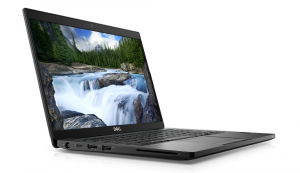The workplace is evolving more quickly than even the most adept futurists could have imagined, from the way offices are laid out to the flexible hours many of us work. Dell EMC’s Workplace Transformation study found 60 percent of employees work after hours and two-thirds complete some business at home. Interestingly, even with all these changes and the advent of new workplace technology like VR and IoT, the PC remains the backbone of our workday.

The challenge is that technology keeps improving by 10x every five years, so the PCs of yesterday often don’t fully support the needs of today’s worker. Relying on this outdated technology to complete day-to-day business tasks can hinder organizations in a number of areas, from productivity to security to employee satisfaction levels.
For workers on the go, the design of their laptop has importance beyond surface-level aesthetic appeal. If the laptop is too large and bulky, it can be difficult to work on an airplane tray table or lap. If it’s a small laptop but a few years old, it may not have the battery life to make it through a trip. In addition, the screen may provide too small a viewing area for the worker to effectively perform certain tasks, like comparing multiple spreadsheets.
Nearly half (47%) of IT decision makers have already noticed disruptions to overall productivity due to their companies’ outdated devices. There is a measurable difference even in laptops that are only a few years old. Our study found that one-year-old PCs offer 11% productivity gains as compared to a two-year-old PC. This may not seem like much at first, but this tech-induced productivity gain equates to 21 additional full days of work per year for the average worker, incurring $15,000 in savings a year per employee.
Outdated technology not only causes productivity issues; these older laptops and tools also may fail to protect workers from the latest security threats. In fact, 46% of IT decision makers say older PCs are more susceptible to security breaches. This is not a risk worth taking, and threats can materialize in a number of ways for mobile workers. For example, if an employee’s laptop is stolen while working from a coffee shop, older technology may not have the robust security features, like multi-factor authentication, needed to keep the laptop’s data safe.
Technology can also affect individual employees in unexpected ways. If workers don’t have the proper tools to effectively do their jobs day in and day out, they are likely to become frustrated and unhappy in their role. Eighty-two percent of millennials – the generation that now makes up the largest portion of the workforce – say technology influences the job they take, and another 42% say they would quit a job that didn’t provide the technology they needed to excel at their jobs.
When making product development decisions, Dell focuses heavily on mitigating real-life scenarios like these. It’s because of the conversations we have with our business customers that we’ve developed products like the new Latitude 7380 notebook coming available on August 15th on Dell.com. We designed the Latitude 7000 Series to better reflect the needs of today’s mobile workforce. We focused on making it as lightweight and small as possible, but also gave users the option to choose a smaller bezel, giving the screen more real estate in a 13-inch display.
We also incorporated a range of advanced security features, including the option to implement multi-factor authentication, such as infrared cameras that enable workers to log in through facial recognition, touch fingerprint reader, contacted FIPS 201 Smart Card Reader, and contactless smart card reader/NFC with Control Vault 2™ FIPS 140-2 Level 3 certification and Dell Client Command Suite.
We custom-built this laptop’s accessories with the needs of flexible workstations in mind. While on the go, workers can utilize a hybrid adapter and power bank to stay powered up, a DA200 adapter to connect to a range of inputs including USB, HDMI, and Ethernet, and even a slim backpack for easy transfer. Back at the office, employees can connect the laptop to their office setup with a wireless keyboard and mouse, and multiple monitor docking options including DisplayPort™ over USB Type C and Dell Wireless dock to keep working seamlessly between locations within minutes.
As business owners, you know that your competitive edge often relies on the smallest of details. For today’s workers, who are in motion for much of their work week, these small details can drastically affect their productivity and, ultimately, their satisfaction. Don’t let your technology be the reason your company and employees are stuck in the past. Ask yourself whether your technology is providing the firm foundation your company needs for growth. And if the answer is no, consider what you’re sacrificing as a result.